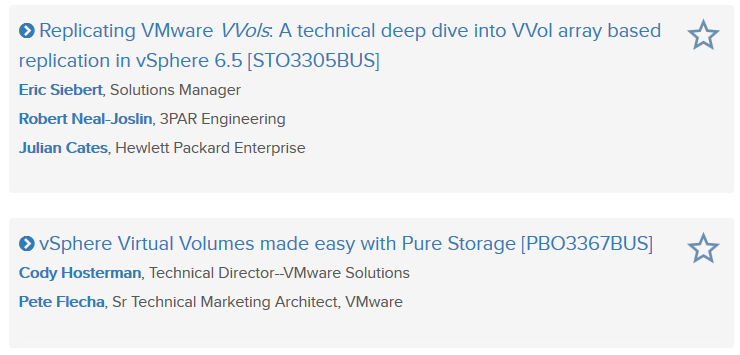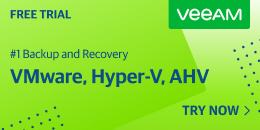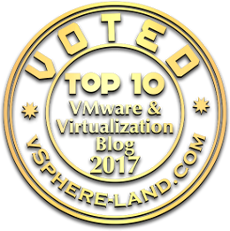I submitted two sessions on VVols as part of the VMworld Call For Papers this year. Based on the great attendance at my VVols session last year I was hoping to get at least one through. So when the notices went out that both my sessions were declined I was a bit disappointed. The rational notes that we got back said “BU direction to cut back on the # of VVols sessions for VMworld”. I also made some inquiries at VMware and confirmed this, apparently the VMware Storage BU has decided to stop marketing VVols and as a result they declined just about every submission related to VVols this year. This is in sharp contrast to last year were there were 5 VMware VVol sessions, 1 partner panel and 9 partner VVol sessions.
So why did VMware decide to stop promoting and marketing VVols? Simple reason is it’s basically a feature or core architecture of vSphere, it’s not really a product that they sell or monetize in any way like VSAN is for them. I believe they feel they have done enough already to promote VVols since it’s initial launch in March 2015 and now it’s up to the storage vendors to promote their own VVols solutions. When you think about it, it’s basically the same as other core integration features like the vSphere APIs (VAAI, VADP, etc). At it’s core VVols is mainly VASA which is the specification that VMware writes that allows storage vendors to develop VVols solutions specific to their own arrays. As a result every storage vendor is going to have their own VVols solution were they can pick and choose what capabilities they want to advertise to storage policies and what features they want to implement to support VVols.
So does this mean that nobody cares about VVols anymore? I think that is far from the case, VVols is still relatively new and there are a lot (most) of storage vendors still trying to catch up with it and deliver mature solutions for VVols. There are definitely some great benefits that VVols provides and it will take time for it to become the norm as customers (and VMware) migrate away from VMFS. I talk to people about VVols fairly often and the education and understanding level of what VVols is and why a customer would want to migrate to it are very low. I do find that as customers discover more about VVols their interest level in it grows significantly.
I was talking a 3PAR product manager the other day who recently attended HPE Discover and he had a lot of people asking about VVols to try and learn more about. I find the same to be true at VMUG events I attend and the fact that I had almost 1,000 people register for my VMworld VVols session last year proves that customer interest in VVols is high. Now that VMware has pulled back from promoting VVols, it’s now up to the storage vendors to do more to promote it and educate customers. For any vendor with a solid VVol solution it’s clearly to their advantage to market that as there are many storage vendors struggling to catch up with VVols and having a solid and mature solution is a competitive edge in VMware environments.
As for the number of VVols sessions at VMworld this year, it was 2 but I see a 3rd one was just added to the Content Catalog (see below). There is only 1 VMware session on VVols, it’s the VVol Deep Dive they do every year with Patrick Dirks & Pete Flecha. The other 2 are sponsor sessions as no VVol partner submissions made it through the CFP process. One is a HPE/Nimble session on VVol Replication which is basically one of the submissions I did for the CFP turned into a sponsor session (without adding any marketing). I have one of our 3PAR engineers joining me for that session to give a very technical deep dive on VVol replication. I was also able to add Julian Cates from Nimble to the session as well as HPE & Nimble are the only 2 vendors that support VVol replication today. The other partner session is from Pure Storage who is finally bringing their VVol solution to market.
So if you are attending VMworld this year and want to know more about VVols and the new replication capability in vSphere 6.5 be sure and sign up for our HPE sponsor session and we will do our best to give you a great technical deep dive on it.





